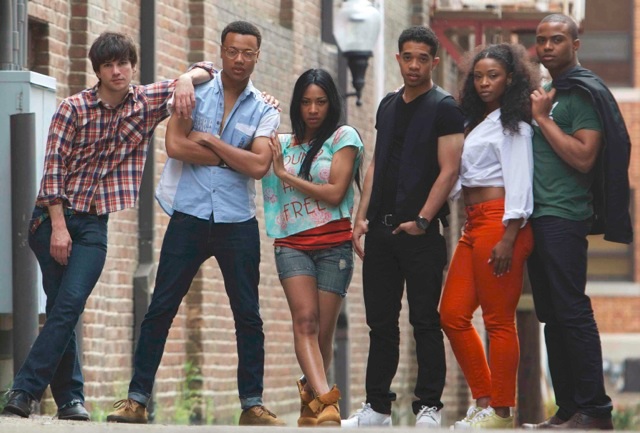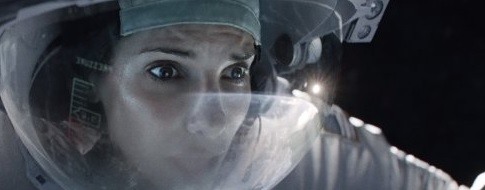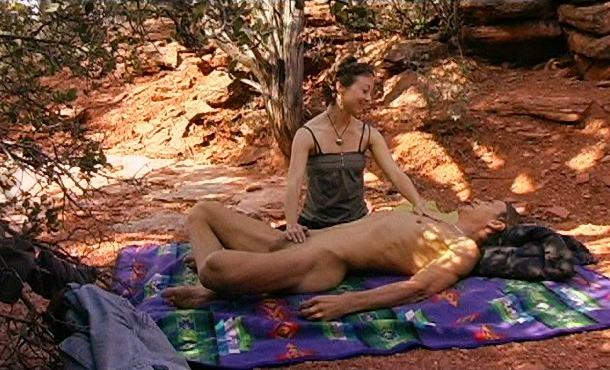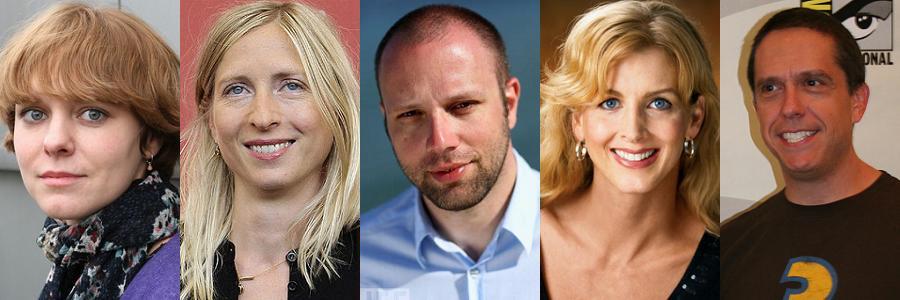Toronto Film Festival XXL

Sep 10: I'll update this post with my tweeted responses to these films, hopefully once a day.
Sep 8: Completed my final ticket selections this morning during my assigned window for the Back Half Pass (which gives you a slightly discounted rate for movies playing in the last five days of the festival). That's 45 features, two programs of 15 shorts, and 14 tickets I got for other people, and I got my first choices across the board. Clearly the other shoe will drop somehow, but for now I'm all blissed out. I'll try to post some updates here during the fest, but my Twitter account will be the place to catch more immediate responses. Please follow! And track these other friends who always provide great TIFF impressions, too: Alex, Amir, Angelo, Bill, Calvin & Yonah, Catherine, Joe (also @decider), Katey, Lev, Nathaniel, Tim, and Yaseen. If you see a movie you like, I'd love to hear about. As, I'm sure, would any filmmakers on Twitter, especially those who aren't in the Gala divisions. I've had great experiences cold-tweeting (?) directors whose work I just saw, and I heartily recommend it. And if there's no way you can be at TIFF but spot a film you desperately wish you could access, tweet a filmmaker about that, too. See if there's a college, cinema, library, or other institution near you that might be willing to host a screening, with or without the director's involvement. Tschüss!
Sep 6: Could things be better? I logged on precisely at 8am Chicago time to buy single tickets this morning and was #143 in line. Others who did the same were 600 spots behind me; by the time I completed checkout at 8:30, there were more than 2600 people waiting. I got into all 13 showings I was hoping to add, too. With the total currently standing at 41 films and from 30 different countries, I have another half-dozen titles to add on Tuesday, when my Back Half pass goes into effect. And then, just four days from now, the games begin! Amy and Bradley are still dancing, girl. Channing, keep spinning, keep burning it up. Did he who made the lamb make thee?
Sep 1: I'm updating my listings below to reflect some of the Middle Eastern and African programming that I will be catching in Toronto, in cahoots with my favorite TIFF programmer, Rasha Salti. I didn't know Rasha at all or much about her cinematic beat until 2013, when Ladder to Damascus, Rags and Tatters, and Noye's Fludde (Unogumbe) all ranked among my favorites of the whole festival. Last year, Silvered Water, Syria Self Portrait and Iraqi Odyssey were my absolute peaks of TIFF, with Timbuktu not far behind, and Rasha and I got to talking. This year, I'm collaborating with her to see and promote her programming, all grouped here, because it's so dependably excellent, yet few of the films ever achieve a DVD release, much less a commercial distribution. So let's get behind these phenomenal movie-makers and under-heralded cinematic traditions.
Sep 1: Toronto International Film Festival season has begun, baby, and we at Nick's Flick Picks (read: I) could not be happier. I'll be there longer than I ever have before, and seeing an even greater number of movies. Logged in this morning at my TIFF-appointed time to make my first 30 ticket selections, 20 of which were for me, 10 for friends who wanted to see movies we worried would sell out. I'll keep updating this entry over the next week or so as my itinerary expands, when individual tickets go on sale, and when my Back Half discount kicks in. So, keep checking this page, and click the links if you want to learn more about the movies. I don't, really: I'm picking based on affinity for the filmmakers, general buzz, and the dimmest notion of premise (and in some cases, I don't even know that). I like going in as cold as possible, so I'm going to keep it that way.
The list is bound to get more esoteric, since I prioritized films that seemed likely to draw big crowds and/or I hoped to see in the first few days. And if you're like, "These already look pretty esoteric," then that's Nick's Flick Picks for you.
MY TIFF ITINERARY (Updated 9/20)
3000 Nights (Palestine, dir. Mai Masri)
B+ Stirring drama inside Israeli women's prison, with mostly Palestinian inmates. Gutsy takes on solidarity, maternalism.
Anomalisa (USA, dirs. Duke Johnson and Charlie Kaufman)
C+ Could summon no enthusiasm. The self-pity of Kaufman's men is usually ballasted by much more creative detail or insight.
Arabian Nights, Vol. 1: The Restless One (Portugal, dir. Miguel Gomes)
A A+? So many good films here but this inhabits a whole other level as piebald art and political intervention.
Arabian Nights, Vol. 2: The Desolate One (Portugal, dir. Miguel Gomes)
A– Less obviously intricate than Vol 1, and more frontal in stating themes—I thought. Then I grew less sure.
Arabian Nights, Vol. 3: The Enchanted One (Portugal, dir. Miguel Gomes)
A What Obama said about guns and religion, but about chaffinches. Heavy histories shrink to bearable fetishes.
As I Open My Eyes (Tunisia/France, dir. Leyla Bouzid)
B+ Sonorous, trenchant portrait of an artist as a young woman, riding sharp lines between petulance and dissidence.
The Assassin (Taiwan, dir. Hou Hsiao-hsien)
B+ A royal marriage of many lines, sumptuous, as much Unforgiven as Scarlet Empress. Hou's hand still unsteady on story.
Bang Gang (A Modern Love Story) (France, dir. Eva Husson)
B+ Remarkably assured, richly executed debut. Not all story beats fresh but layered, meticulous study.
Beasts of No Nation (USA, dir. Cary Joji Fukunaga)
B– Value, impact hard to deny but formal and narrative storytelling are a little crude. Young Attah is a find.
Blood of My Blood (Italy, dir. Marco Bellocchio)
C+ My astigmatism around high-theatrical Italian melodrama persists. Less crude than Vincere but ideas seem simple?
Cemetery of Splendour (Thailand, dir. Apichatpong Weerasethakul)
B Reader, I must confess I'm starting to find Weerasethakul tedious, as much as I admire his directorial craft.
Chevalier (Greece, dir. Athina Rachel Tsangari)
B Greek surrealist, quasi-Apatovian remake of American Psycho business-card scene. Finds its berth fast, hangs out a while.
Dégradé (Palestine, dirs. Arab Nasser and Tarzan Nasser)
B– Entrapment, suffocation are topics, occasionally effects of one-set suspenser in Gaza salon. Bold vision. Hang in there.
Dheepan (France, dir. Jacques Audiard)
A– Sleek, observant, steadily winching synthesis of prior Audiard themes. Psychology deftly externalized. Actors keep it hot.
The Endless River (South Africa, dir. Oliver Hermanus)
B Strikingly shot. Taps a rich seam of region-specific tensions and story traditions. Maybe exploits them a bit.
Eva Doesn't Sleep (Argentina, dir. Pablo Agüero)
B Eva Perón as Addie Bundren. Caryl Churchill-esque. Brute embodiments and symbolic afterlives in unwinnable duels.
Evolution (France, dir. Lucile Hadžihalilovic)
B What if Matthew Barney and Jacques Cousteau co-directed a YA dystopia? I couldn't imagine, but Lucile Hadžihalilović did.
Fire Song (Canada, dir. Adam Garnet Jones)
C– Noble intents, rare focus, and solid production values lose out to stiff writing and editing, erratic hold on character.
Francofonia (France/Germany/Netherlands, dir. Aleksandr Sokurov)
A Louvre, the End of History. Witty, moving essay on doomed objects surviving, enemies collaborating, time as tight knot.
Frenzy (Turkey, dir. Emin Alper)
B+ Formally stunning mitosis of one suspense thriller into two, enigmatically related. Two parts Audiard, one Don't Look Now.
Girls Lost (Sweden, dir. Alexandra-Therese Keining)
C+ A century after Florida Enchantment, we're still using magic-beans device for transgender tale. Shaky on its own themes.
Green Room (USA, dir. Jeremy Saulnier)
High-Rise (UK, dir. Ben Wheatley)
TIFF canceled my screening.
The Idol (UK/Palestine, dir. Hany Abu-Assad)
Couldn't access the screening.
In Jackson Heights (USA, dir. Frederick Wiseman)
A– Most democratic US community abounds with sidewalk pedagogy and filibusters. Everyone tries to save everyone.
In the Shadow of Women (France, dir. Philippe Garrel)
B+ Tiny ficelle of a film takes witty stock of knotted infidelities. Neither one-sided nor free of judgment.
Ixcanul (Guatemala/France, dir. Jayro Bustamante)
A Guatemalan drama quietly, sturdily makes expert choices scene after scene, culminating in my biggest jaw-drop of the fest.
Let Them Come (Algeria/France, dir. Salem Brahimi)
Couldn't access the screening.
Minotaur (Mexico/Canada, dir. Nicolas Peréda)
A– Totally bewitching miniature about profound indolence. Possibly class critique of a new, Lynch-meets-Pina Bausch type.
Mountains May Depart (China/France/Japan, dir. Jia Zhangke)
B– Hi, I'd like a Hong Sang-soo, a Stella Dallas, a Notes on a Scandal (iced), and a small side of Drrrainage?!
Much Loved (France/Morocco, dir. Nabil Ayouch)
A– Bracing, gutsy, humane drama of Moroccan prostitutes. Moving and nuanced images, sounds, and characters. Pass it on!
No Men Beyond This Point (Canada, dir. Mark Sawers)
Wound up skipping for Ixcanul
The Other Side (France/Italy, dir. Roberto Minervini)
B+ Beasts of one nation, arguably under God, arguably indivisible. An upsetting revelation no matter how "true" it is.
The Pearl Button (Chile/France/Spain, dir. Patricio Guzmán)
B+ Empathic, poetic speculation from a filmmaker whose equanimity is a miracle. Not quite Nostalgia but much-needed.
Price of Love (Ethiopia, dir. Harmon Hailay)
B Some story beats are sadly familiar, but this streetside Ethiopian drama conveys them with nuance and piquant detail.
The Promised Land (China, dir. He Ping)
D Way too airy-fairy Chinese romance between ballerina and hockey coach. Barely a premise, endlessly pre-rehearsed.
Return of the Atom (Finland, dirs. Mika Taanila & Jussi Eerola)
B– Vividly mounted and persuasive on its basic grounds, but several editing and sound choices baldly manipulate.
Right Now, Wrong Then (South Korea, dir. Hong Sang-soo)
A– Lovely. Iridesces with sadness. Hong's Purple Rose of Cairo? Well, that's not exactly true. Nothing ever is.
Schneider vs. Bax (The Netherlands, dir. Alex van Warmerdam)
B Another 18th-century comedy about 21st-century mercenaries. Merrily morbid, somewhat for its own sake. Thin look.
Short Cuts Program #5 (Canada/France/Germany/Iraq/Spain/UK, dir. Misc.)
B– No clinkers, few coups. My faves were the angry Society and the compactly suggestive New Eyes and El Adíos.
The Sky Trembles and the Earth Is Afraid and the Two Eyes Are Not Brothers (UK, dir. Ben Rivers)
B As elaborate and idiosyncratic as it is, the postcolonial metaphors become a bit flat and static.
Son of Saul (Hungary, dir. László Nemes)
A So formally brilliant you can't help noticing, even as you expend all emotional and moral energy. The sound! The story.
Starve Your Dog (Morocco, dir. Hisham Lasri)
B Boldest shredding I've seen here of cinematic form, story flow. Death and the Maiden as punk Moroccan cherry bomb.
Story of Judas (France, dir. Rabah Ameur-Zaïmeche)
B+ Daring rewrite of 2000-year-old treachery, passing for a long time as classical, almost POV-less account. Gorgeous.
Sunset Song (UK/Luxembourg, dir. Terence Davies)
C– First hour a stilted slog. Middle fights its way to poignancy but last act falters. Barely ten oxygen molecules in it.
Taxi (Iran, dir. Jafar Panahi)
B Feels less ambitious than Panahi's two previous house-arrest movies but it's funny and wise and has good tricks up its sleeve.
Te prometo anarquía (Mexico, dir. Julio Hernández Cordón)
B+ Rare bird. Rewards patience and trust as it builds from vaguely illicit skater/dealer pic to humbling tragedy.
The Treasure (Romania, dir. Corneliu Porumboiu)
A– Comic gold, with an impressively ferrous structure of ironies and nuances that hold it together and expand its scope.
Victoria (Germany, dir. Sebastian Schipper)
A– Morvern Callar rebuilt as pulse-pounding thriller, astonishingly executed in a continuous, 132-minute take. Overwhelming.
Wavelengths #4: Psychic Driving (Austria/Brazil/Canada/France/Spain/USA, dir. Misc)
A– Links radical activism to African diaspora, occult folklore to synaesthetic abstraction. Dazzling.
The White Knights (Belgium/France, dir Joachim Lafosse)
Wound up skipping for Beasts of No Nation
The Witch (Canada/USA, dir. Robert Eggers)
C Antichrist meets The Village. Spooky surface meets crossover dreams. Old tropes about faith meet some about the colonies.

Labels: Aleksandr Sokurov, Apichatpong Weerasethakul, Charlie Kaufman, Documentary, Festivals, France, Frederick Wiseman, Happy Boy, Hou Hsiao-hsien, International, Iran, Terence Davies, TIFF
 Nick's Flick Picks: The Blog
Nick's Flick Picks: The Blog


 8.
8.  9.
9.  10.
10. 



 I've known since I moved here that I shared a spiritual link with the
I've known since I moved here that I shared a spiritual link with the  Miss Julie, despite being an Irish-set and substantially Irish-funded production, also commences in its way CIFF 2014's spotlight on Scandinavian cinema, which encompasses among many other films Ruben Östlund's festival smash
Miss Julie, despite being an Irish-set and substantially Irish-funded production, also commences in its way CIFF 2014's spotlight on Scandinavian cinema, which encompasses among many other films Ruben Östlund's festival smash 

 Thanks to everyone who's been so patient with the Great Blogging Drought of 2011. It's a huge year for me in terms of writing deadlines and professional obligations, which is the only reason I've been so scarce. Believe me, if I had time to write about the rapturous Tree of Life, I would! Even I don't think
Thanks to everyone who's been so patient with the Great Blogging Drought of 2011. It's a huge year for me in terms of writing deadlines and professional obligations, which is the only reason I've been so scarce. Believe me, if I had time to write about the rapturous Tree of Life, I would! Even I don't think  I was chuffed to get an e-mail today from Aghion, whom I do not know, informing me about a historical and cultural center that she and a colleague are trying to open in Rwanda. Many of us who hear the name of that country still think immediately of genocide, although I'm happy to say that I now have a friend living in Kigali whose reports are giving such a different, richer sense of the nation. Still, even Rwandans have painfully limited access to their own audiovisual history, so Anne Aghion and Assumpta Mugiraneza are working hard to open a Media Archive called
I was chuffed to get an e-mail today from Aghion, whom I do not know, informing me about a historical and cultural center that she and a colleague are trying to open in Rwanda. Many of us who hear the name of that country still think immediately of genocide, although I'm happy to say that I now have a friend living in Kigali whose reports are giving such a different, richer sense of the nation. Still, even Rwandans have painfully limited access to their own audiovisual history, so Anne Aghion and Assumpta Mugiraneza are working hard to open a Media Archive called  Jonathan Schell and Eric Liebman's frisky, earnest, hilarious, eye-rolling, and eye-opening documentary
Jonathan Schell and Eric Liebman's frisky, earnest, hilarious, eye-rolling, and eye-opening documentary  I normally wouldn't double up on posts during the same day, especially when I've already linked to
I normally wouldn't double up on posts during the same day, especially when I've already linked to 





 It's been months since I wrote a full-length review of a first-run film, and I was worried about getting kicked off the blogosphere. So, eenie-meenie, meinie-mo, the most recent release I screened as this impulse hit was
It's been months since I wrote a full-length review of a first-run film, and I was worried about getting kicked off the blogosphere. So, eenie-meenie, meinie-mo, the most recent release I screened as this impulse hit was  The most searching and inspiring conversations I have ever enjoyed with a filmmaker I had with Kimberly Reed, the director of the extraordinary, autobiographical documentary
The most searching and inspiring conversations I have ever enjoyed with a filmmaker I had with Kimberly Reed, the director of the extraordinary, autobiographical documentary  Motivating all of these words is the news that Marc
Motivating all of these words is the news that Marc 














